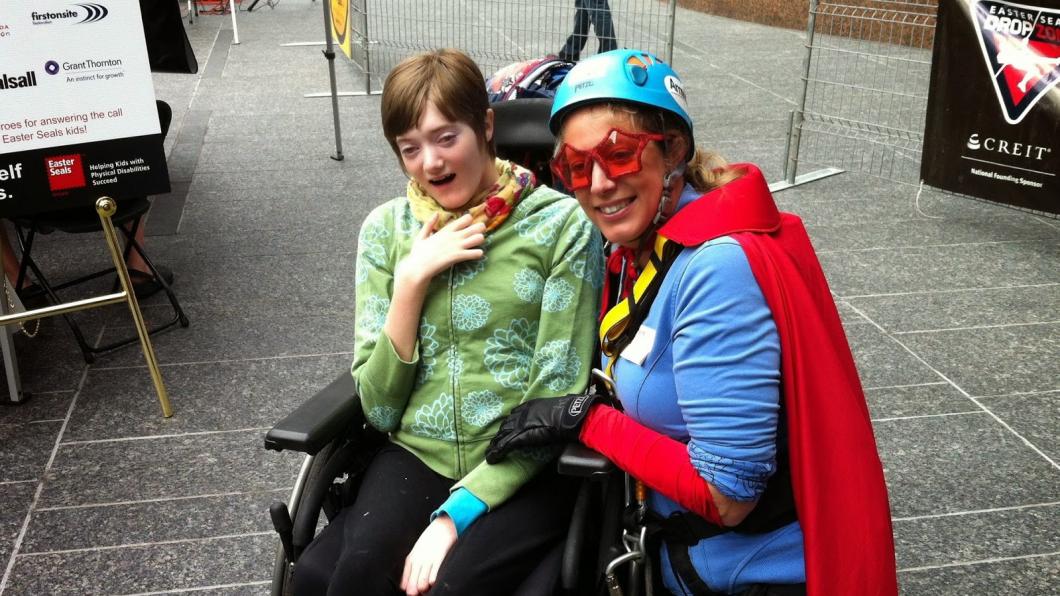
'You go to places you never thought you could'
By Louise Kinross
Life with children with disabilities and chronic health problems is complicated. It can be traumatic and a source of heartache.
But it can also be life-changing in a positive way, says Laura Kerr Meffen, mom to Emily, 16, who has a rare metabolic disorder and multiple disabilities.
“With Emily it was kind of a tragedy and a grief, but I’ve had so many positives with having her in my life,” Laura says. “Sometimes you feel guilty that you’re using your child’s disability or a trauma to have positive experiences. Or people think you should be grieving and sometimes you aren’t.”
She better understood her experience after attending a workshop last month at the 2014 conference of the Ontario Association of Children’s Rehabilitation Services.
“They talked about something called posttraumatic growth and it validated the feelings that I had and gave them a name and a positive spin,” Laura says.
Posttraumatic growth in parents and pediatric patients is a review of 26 journal papers on positive psychological change that results in parents or children after a child's traumatic medical event (including cancer, prematurity and acquired and congenital disability).
“Posttraumatic growth is the positive psychological change that results from a struggle through a life-altering experience,” write the authors of the Journal of Palliative Medicine study. It may include “greater appreciation of life, improved relationships, greater personal strength, recognition of new possibilities in one's life course, spiritual or religious growth, and reconstruction of a positive body image.”
The authors conclude that posttraumatic growth is an important, little studied and poorly understood phenomenon affecting children with serious pediatric illness and their families. They suggest research is needed on how professionals can positively intervene “to facilitate families' movement away from dysfunction or deterioration and toward growth.”
Laura says the concept of posttraumatic growth helps to explain her experience parenting Emily.
“I guess the biggest positive is that I’ve changed my life to recognize the small things, the little things that other people take for granted. I know now that life is not about money or career. It’s about doing things that make me and my family happy. It’s about being with friends and family who make you feel good and surrounding yourself with those people.”
Laura says that her decision to leave work to care for Emily full-time was initially hard, “but then I made myself a life as a professional special-needs mom. I think it’s okay to have positive feelings about that and to feel like my child is unique and special, and so am I.”
Laura says she’s grown in ways she never would have without Emily. “You become an advocate, and you go to places you never thought you could, meeting people you never would have otherwise.”
An example is her participation last year in the Easter Seals Drop Zone fundraiser where she rappelled down an 18-storey office building (see photo above of Emily and Laura dressed as a “Super Mom Hero”).
Laura advocates for and develops recreation programs for people with disabilities by sitting on a Markham Parks & Recreation committee and on the Markham Sports & Recreation Accessibility Committee.
She’s also played a key role in fundraising and writing grants to support the first universally accessible schoolyard in Markham at James Robinson Public School. This is a community school her children attended. “The playground will be accessible to all,” Laura says. "It will have an accessible outdoor classroom, an accessible stage, sensory and community gardens, loose play with pine cones, rocks and pots and pans, and play equipment that is connected by a paved serpentine trail with ‘calming bumps’ for wheelchair users,” Laura says. The group has raised over $100,000 to date for the project and needs another $100,000 to cover the play equipment, Laura says.
She hopes the study of posttraumatic growth helps parents understand that all of their emotions raising children with disabilities are valid. “It’s okay to have positive feelings and it’s also okay to grieve. I’ve grown, and it’s important for parents to know that we can be empowered and have positive outcomes raising our children.”